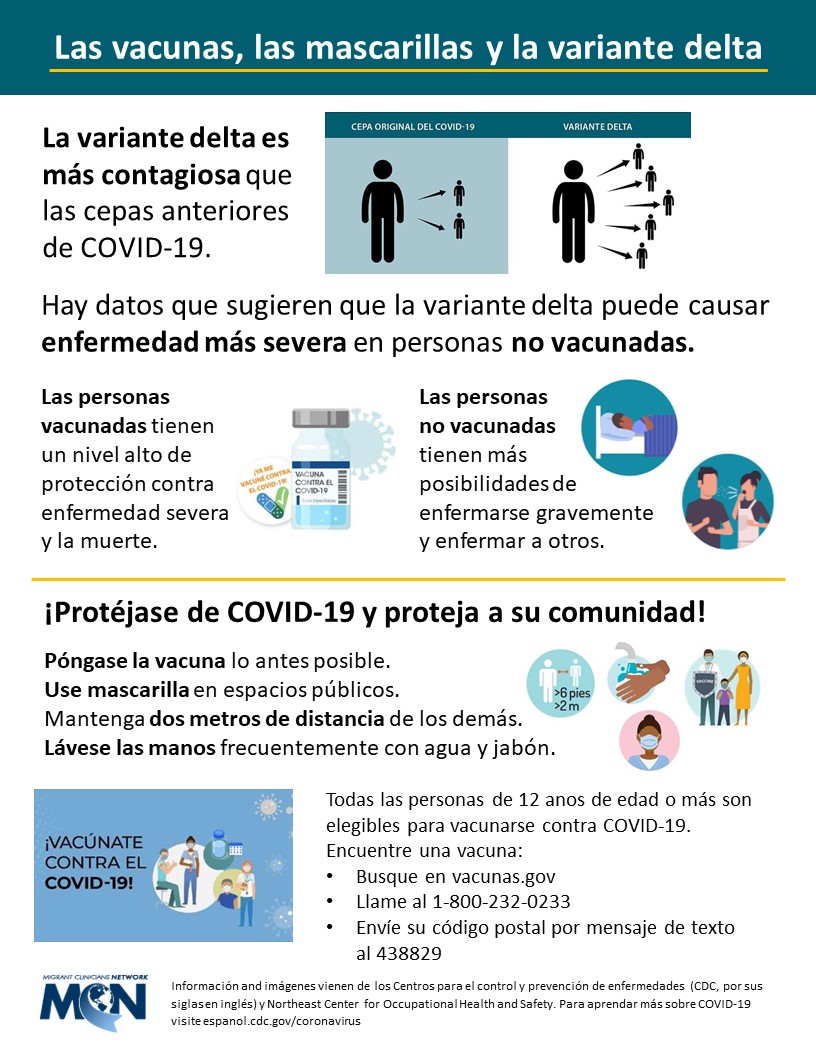
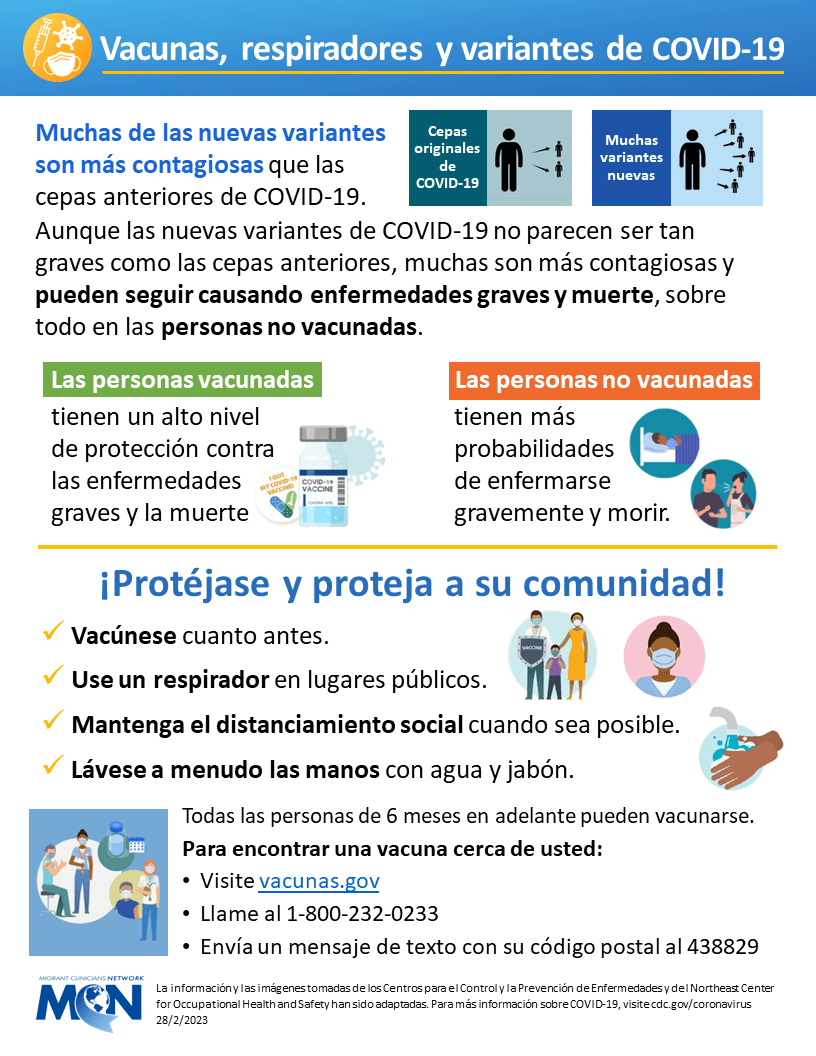
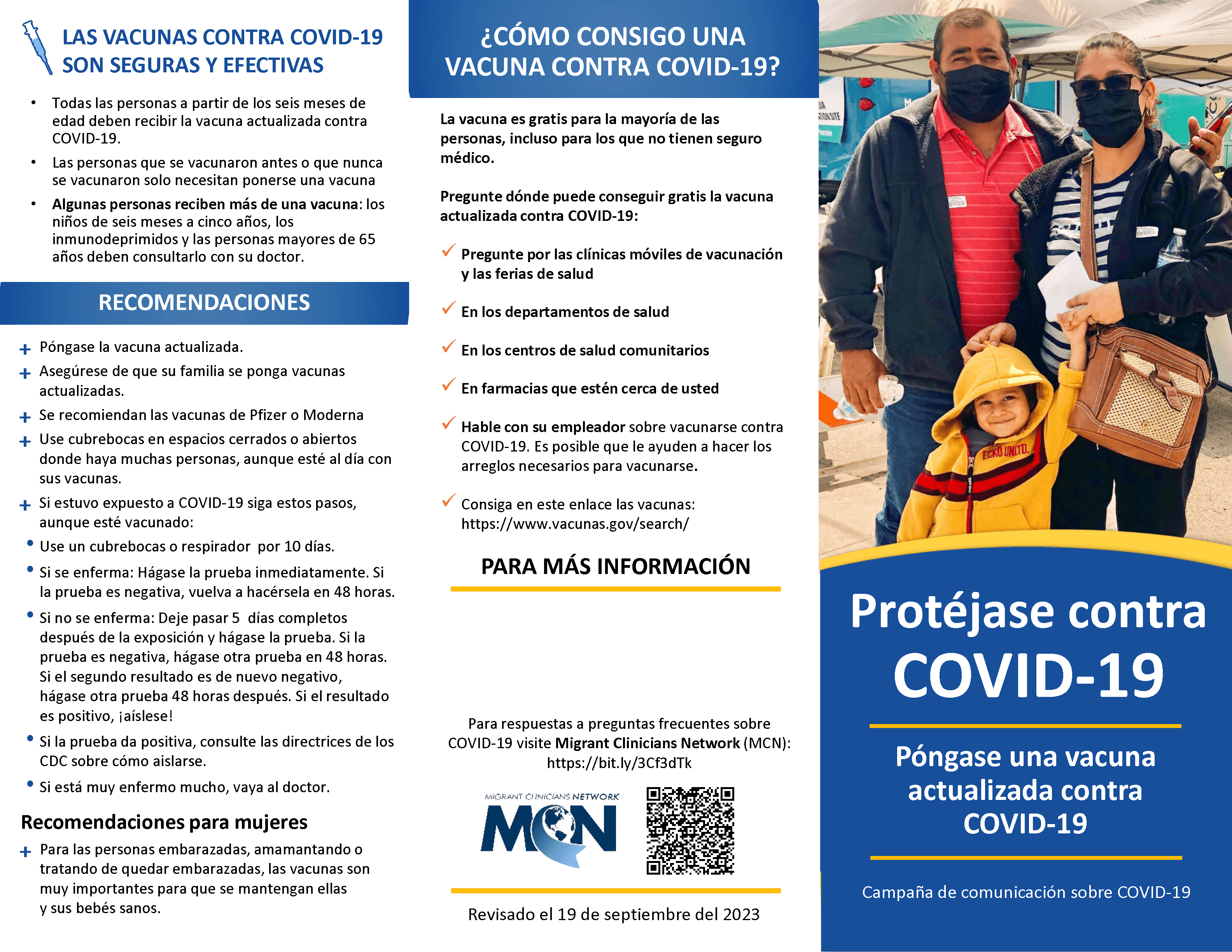
- 2023-10-05_General-COVID-Vacuna-Tríptico_Material-de-apoyo_2.pdf (607.45 KB)
- 2023-10-05_General-COVID-Vacuna-Tríptico_Material-de-apoyo_Plantilla_2.pptx (2.66 MB)
- 2023-10-05_General-COVID-Vaccine-Trifold_Handout_2.pdf (582.8 KB)
- 2023-10-05_General-COVID-Vaccine-Trifold_Handout_Template_2.pptx (2.67 MB)
- 2023-10-5_Modèl_depliyan_sou-vaksen-COVID-Jeneral_2.pdf (594.07 KB)
- 2023-10-5_Modèl_depliyan_sou-vaksen-COVID-Jeneral_2.pptx (2.58 MB)
El calendario ofrece información simple y sencilla en español sobre las vacunas y algo de información sobre por qué los adultos también necesitan vacunas. Está disponible en alta resolución para descargar e imprimir en tamaño póster.
This almost real-time map shows where COVID-19 cases have been reported, all over the world, which provides some perspective and allows for a visual understanding of the spread as it progresses.
NACHC’s new FAQ runs down a number of additional resources not covered here, specifically tailored for health centers.
HRSA’s new COVID-19 FAQs give some overview on the health center requirements around emergency preparedness as well as recommendations for communications from health centers.
This new poll, taken by Migrant Clinicians Network in January and February 2018, reflected the experiences of clinical staff from 26 states across the country. Respondents came from every corner of the clinic; occupations listed include Physician, Executive Director, Dental Assistant, Outreach Specialist, Therapist, Community Health Worker, Registered Nurse, and 24 other occupations. The poll follows up on MCN’s 2017 poll, in which 63 percent of respondents indicated that immigrant and mobile patients’ attitudes and feelings toward health care access had changed.
- Poll Results February 2018.pdf (92.89 KB)
California's Medical Supervision Program is a biomonitoring program that measures cholinesterase activity in bloog samples from agricultural workers. Employers are required by law to contract with physicians who have registered for this program, all of whom are included in this list.
Safety and Health Practicesfor Nail Salon Workers and a Training Guide for Nail Salon Worker Safety and Health Outreach Program
- Best_Practices_HOPE.pdf (230 KB)
- Trainer_Guide_HOPE.pdf (1.34 MB)
Includes EPA manual "How to Comply With the 2015 Revised Worker Protection Standard For Agricultural Pesticides - What Owners and Employers Need To Know" and an excerpt specifically for clininicians regarding medical evaluation and respirator fit test. See also the medical evaluation questions in English and Spanish.
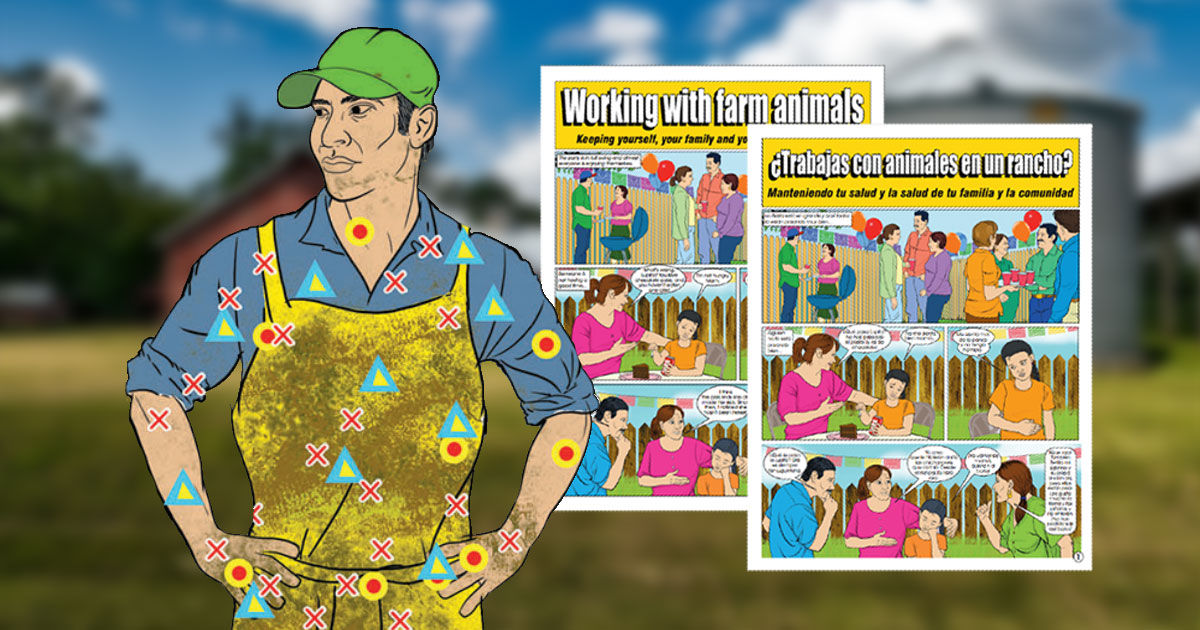
Libro cómic educativo bilingüe sobre cómo prevenir las enfermedades zoonóticas. Desarrollado por MCN en colaboración con la Universidad Estatal de Ohio.
- Working with farm animals_1.pdf (13.33 MB)
- Trabajos con animales en un rancho_1.pdf (13.31 MB)
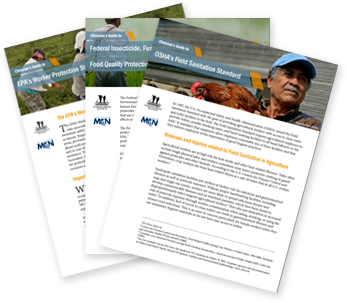
MCN y Farmworker Justice ofrecen estas guías para ayudar a los médicos en la comprensión de regulaciones de salud y seguridad de los campesinos. Información de los Estándares de Saneamiento de la Administración de Seguridad y Salud Ocupacional (OSHA) para los campos; la Ley Federal de Insecticidas, Fungicidas y Rodenticidas (FIFRA) regulado por la Agencia de Protección Ambiental (EPA); la Ley de la Protección de la Calidad de los Alimentos (FQPA) también regulado por el EPA; y el estándar de protección del trabajador (WPS) establecido por el EPA.
- OSHA's Field Sanitation Standard Clinician's Guide.pdf (747.53 KB)
- FIFRA FQPA Clinician's Guide.pdf (287.9 KB)
- WPS Clinician's Guide.pdf (843.35 KB)

MCN y Farmworker Justice ofrecen estas guías para ayudar a los médicos en la comprensión de regulaciones de salud y seguridad de los campesinos. Información de los Estándares de Saneamiento de la Administración de Seguridad y Salud Ocupacional (OSHA) para los campos; la Ley Federal de Insecticidas, Fungicidas y Rodenticidas (FIFRA) regulado por la Agencia de Protección Ambiental (EPA); la Ley de la Protección de la Calidad de los Alimentos (FQPA) también regulado por el EPA; y el estándar de protección del trabajador (WPS) establecido por el EPA.
- OSHA's Field Sanitation Standard Clinician's Guide.pdf (747.53 KB)
- FIFRA FQPA Clinician's Guide.pdf (287.9 KB)
- WPS Clinician's Guide.pdf (843.35 KB)

MCN y Farmworker Justice ofrecen estas guías para ayudar a los médicos en la comprensión de regulaciones de salud y seguridad de los campesinos. Información de los Estándares de Saneamiento de la Administración de Seguridad y Salud Ocupacional (OSHA) para los campos; la Ley Federal de Insecticidas, Fungicidas y Rodenticidas (FIFRA) regulado por la Agencia de Protección Ambiental (EPA); la Ley de la Protección de la Calidad de los Alimentos (FQPA) también regulado por el EPA; y el estándar de protección del trabajador (WPS) establecido por el EPA.
- OSHA's Field Sanitation Standard Clinician's Guide.pdf (747.53 KB)
- FIFRA FQPA Clinician's Guide.pdf (287.9 KB)
- WPS Clinician's Guide.pdf (843.35 KB)
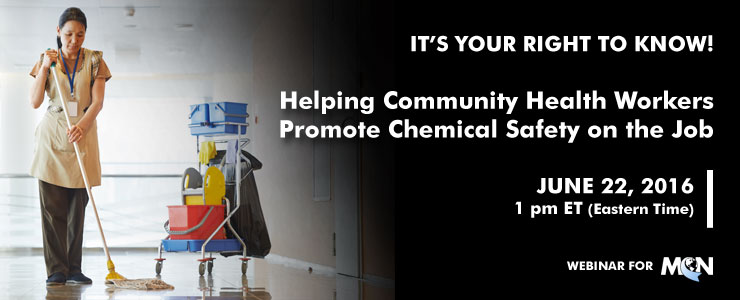
DATE RECORDED: June 22, 2016
PRESENTED BY: Kerry Brennan
This material will be produced under grant number SH-27640-15-60-F-48-SH5 from the Occupational Safety and Health Administration, U.S. Department of Labor. It will not necessarily reflect the views or policies of the U.S. Department of Labor, nor does mention of trade names, commercial products, or organizations imply endorsement by the U.S. Government.
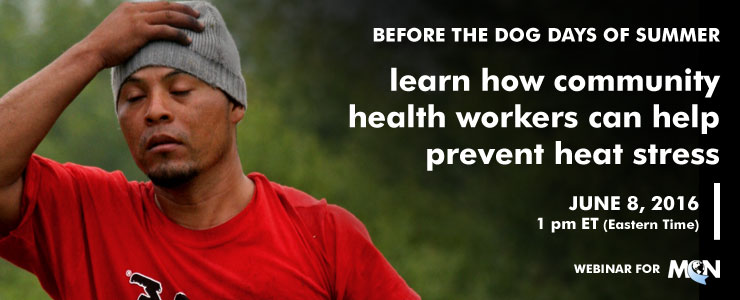
DATE RECORDED: June 8, 2016
PRESENTED BY: Juliana Simmons, MSPH, CHES
This material will be produced under grant number SH-27640-15-60-F-48-SH5 from the Occupational Safety and Health Administration, U.S. Department of Labor. It will not necessarily reflect the views or policies of the U.S. Department of Labor, nor does mention of trade names, commercial products, or organizations imply endorsement by the U.S. Government.
- https://youtu.be/qcCci3GQs04
- http://www.migrantclinician.org/
- https://www.osha.gov/SLTC/heatstress/prevention.html
- http://www.farmworkerjustice.org/sites/default/files/FJpesticidetrainingspanish2016.pdf
- https://www.osha.gov/SLTC/heatstress/index.html
- https://www.osha.gov/SLTC/heatillness/index.html
- https://www.osha.gov/SLTC/heatstress/industry_resources.html
- http://www.dir.ca.gov/dosh/heatIllnessQA.html
- http://www.lni.wa.gov/Safety/Topics/AtoZ/HeatStress/
- http://en.hesperian.org/hhg/Workers%27_Guide_to_Health_and_Safety:Dangers_from_heat
- http://www.naplesnews.com/news/crime/report-farmworkers-death-should-have-been-prevented-2738c212-4e00-109c-e053-0100007fd972-363310521.html
- http://www.cdc.gov/niosh/topics/heatstress/heatrelillness.html
The U.S. Environmental Protection Agency’s (EPA) Worker Protection Standard (WPS) provides basic workplace protections to farmworkers and pesticide handlers to minimize the adverse effects of pesticide exposure. EPA announced major revisions to the WPS in September 2015. MCN and FJ's fact sheet provides a summary of the revised regulation.
- WPS-2015.pdf (981.69 KB)
In 2015, for the first time in over 20 years, the Environmental Protection Agency updated the Worker Protection Standard (WPS). The WPS provides basic workplace protections for agricultural workers to reduce the risk of pesticide exposre. This issue brief overviews the major revisions that are particularly relevant for clinicians caring for agricultural workers.
- WPS_MCN_FJ_IssuesBrief2016.pdf (3.02 MB)

ACA Toolkit:
Available in English and Spanish
Health Insurance Guide:
Available in English and Spanish and Haitian Creole
Older Guides:
Available in English, Spanish, and Haitian Creole for workers on employer-provided health insurance
Created by Farmworker Justice.
- http://www.farmworkerjustice.org/sites/default/files/FJ_ACA_Fact_Sheet_Employer_Provided_Health_Insurance_FINAL.pdf
- http://www.farmworkerjustice.org/sites/default/files/FJ_ACA_Fact_Sheet_Employer_Provided_Health_Insurance_SPANISH_FINAL.pdf
- http://www.farmworkerjustice.org/sites/default/files/FJ_ACA_Fact_Sheet_Employer_Provided_Health_Insurance_CREOLE_FINAL.pdf
The National LGBT Health Education Center provides educational programs, resources, and consultation to health care organizations with the goal of optimizing quality, cost-effective health care for lesbian, gay, bisexual, and transgender (LGBT) people.
Migrant Clinicians Network, Inc. (MCN) will work during the next two years to engage members of our clinical network and all relevant stakeholders to advance health justice for the mobile poor. Our advocacy and education priorities focus on safe and legal entry into the United States, as well as strong and equal protection for workers in all occupations. Advancement in these areas creates the greatest opportunity for all to access high-quality, affordable healthcare.
- Comprehensive Immigration Reform
- Access to Health Care
- MCNAdcovacyAgendaFinal.pdf (148.62 KB)
This new guide from the National Center for Medical-Legal Partnership is intended to help civil legal aid practitioners message their work to health care audiences in order to build stronger cross sector medical-legal partnerships and to encourage investment in that work.
- Framing Legal Care as Health Care.docx (72.27 KB)
On Monday August 18, 2014 MCN submitted technical comments to the EPA regarding the proposed changes to the Worker Protection Standard. View MCN's recommendations for advancing stronger safeguards to protect farmworkers from pesticide exposure.
- MCN_WPS_FinalComments_2014.pdf (164.74 KB)
This proposal will I) provide a profile of the agricultural industry and Farmworkers in Washington State II) propose a theoretical framework to understand farmworker housing accessibility III) describe prior legislative actions to address farmworker housing IV) and propose a set of recommendations to address farmworker housing.
Published July 15, 2014
MCN holds the position that immigrant children fleeing violence in their home countries must receive priority consideration for their safety and health. We have provided several links with additional resources on this issue.
Este diccionario ilustrado bilingüe de MCN, "Seguridad en Palabras/ Safety in Words", muestra los peligros que hay en el lugar de trabajo y las mejores prácticas para la salud y la seguridad en la agricultura. Desarrollado con el apoyo del Programa de Subvenciones Susan Harwood de OSHA, este recurso refuerza el vocabulario en inglés de los trabajadores que hablan español lo que ayudará a prevenir lesiones en la agricultura.
New bilingual resource available April 2014!
Student Action with Farmworkers (SAF) has been using theater as an educational tool with farmworkers for over twenty years. By drawing on techniques of popular theater, SAF performs culturally appropriate, lively skits and facilitates theater workshops at farm labor camps. These performances spur conversations about mental and physical health, living and working conditions, and farmworker movements for social justice.
Many of SAF’s performances have focused on health issues, and they aim for this guide to offer dynamic tools for health care providers, educators, outreach workers, and public health innovators. Practitioners can also use these techniques with other populations across the social justice spectrum. For both organizers and educators, SAF hopes that popular theater can bolster the messages and information that you so readily share and provide a dynamic approach to outreach. Resources include songs, scripts, theater games and icebreakers. Printed copies are free, but SAF accepts small contributions to cover shipping and handling ($5-10/copy).
Available in print and online
Contact: Laxmi Haynes , 919-660-3660
Print, cut, and distribute this handy bookmark to providers who treat migrant and seasonal farmworker patients. The bookmark includes links and a qr code to connect you to pesticide - related clinical tools and resources. In addition, we've included some useful phone numbers in case of a pesticide emergency.
You can also use the bookmark to keep handy the Health Network phone number to be sure your patients on the move remain in care.
- EOHbookmark_final_92013.pdf (722.68 KB)
Este libro cómic bilingüe a todo color trata la indemnización laboral por accidente, los derechos y responsabilidades de los trabajadores inmigrantes que trabajan en granjas lecheras. Cuenta la historia de un trabajador mexicano de una granja lechera que se lesiona en el trabajo y los pasos que él y su empleador dan para asegurarse de que reciba sus beneficios y la granja mejore su seguridad. Incluye historias aplicables en todo Estados Unidos y otras específicas de cada estado.
- DairyWrkrRightsWrkComp_ENG2016_web.pdf (7.78 MB)
- DairyWrkrRightsWrkComp_ESP2016_web.pdf (7.92 MB)
- COMIC - Safety and Health on the Farm - New Mexico - English.pdf (3.4 MB)
- COMIC - Safety and Health on the Farm - New Mexico - Spanish.pdf (3.41 MB)
- COMIC - Safety and Health on the Farm - New York - English.pdf (3.45 MB)
- COMIC - Safety and Health on the Farm - New York - Spanish.pdf (3.46 MB)
- COMIC - Safety and Health on the Farm -Minnesota -English.pdf (7.78 MB)
- COMIC - Safety and Health on the Farm - Minnesota - Spanish_0.pdf (7.91 MB)